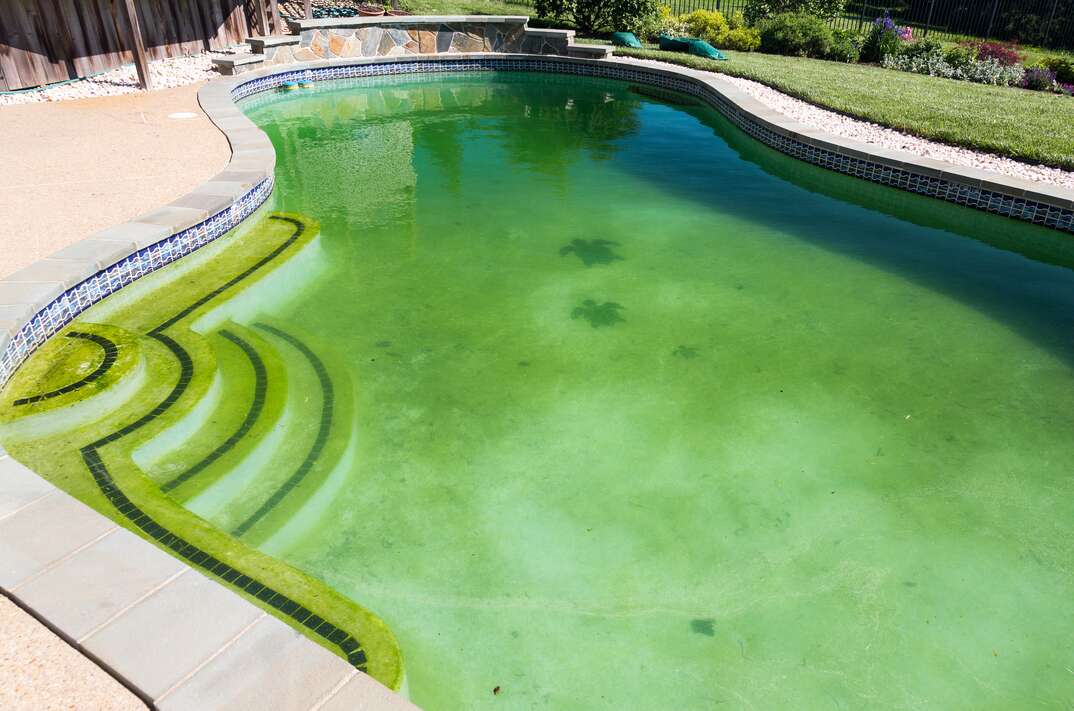- AppliancesElectriciansHVACLandscapingLocksmithPest ControlPlumbingRenovationRoofingT V RepairAll Home Improvement
- Car AccidentClass ActionCorporate LawCriminal DefenseDivorce LawEmployment LawFamily LawFinancial LawLegal AidMedical Injury LawyersMedical MalpracticeReal Estate LawWater Fire RestorationAll Legal
- InvestmentRetirementAll Finance
- Animal InsuranceAutoGeneral InsuranceHealth PolicyHome RentersAll Insurance
- DentalHealth SpecialistsAll Medical
- Animal CareVeterinaryAll Pets
- Auto GlassTowingAll Automotive
Why Does the Water in My Pool Look Murky?

A refreshing swim feels amazing on hot days, but cloudy pool water may make you reconsider your plans. If your pool looks murky or cloudy, find out if a shock treatment was done recently. Shock treatments can affect pool clarity, but you may also have issues with your filtration system or other problems causing hazy pool water.
Read More Home Improvement Articles
When you're greeted by cloudy pool water, you may wonder what's going on in your swimming pool. Numerous culprits, from filtration problems to environmental contaminants, can turn your once-clear pool water murky.
Filtration System Issues
Your pool's filtration system helps thwart the growth of bacteria by removing dirt and debris from the water. Experts generally recommend running a pool filtration system for at least half the day — sometimes longer if the pool gets used frequently. Change the pool filter regularly, and pay attention to signs of a filtration problem, such as hazy water or unusual noises coming from your filtration system. You should also keep an eye on the skimmer boxes in your pool, as damaged or clogged skimmers can affect pool clarity.
Environmental Contaminants
Pool covers help keep pests, pets and kids from going for an unapproved swim, but they can also prevent environmental contaminants from ruining your water. Wind can blow debris like pollen and leaves into your pool, while frequent sun exposure can cause algae growth on the walls or bottom of the pool. Rainstorms can bring bacteria and other icky organisms, which may also cause cloudy pool water.
High Chlorine Levels
Chlorine helps disinfect your pool, which is important. The right amount of chlorine can kill bacteria, break down sweat or body oil and prevent algae growth. However, you have to be careful when adding chlorine, as too much can affect the pH balance of your pool water. This can make chlorine less effective and lead to murky water.
Calcium Scaling
Calcium can be good for your bones, but high levels don't always have the same benefits for your pool. Generally, your pool's calcium level should be above 150 or 200 ppm but below 400 ppm. Low levels can cause corrosion on metal surfaces, while high levels can cause calcium scaling. Calcium scaling can leave behind white dust or gray films, resulting in murky pool water.
Why Does My Pool Look Cloudy After Shocking It?
Pool cloudy after shock treatment? Think back to science class for a minute. Shocking your pool changes its pH levels by increasing the concentration of chemicals such as chlorine. Imbalanced levels can trigger total alkalinity if the pH levels are too high. Low pH levels can make pool water too acidic for a swim, so you must find the correct balance. You can do this by checking pH levels regularly with test strips when you perform pool maintenance.
More Related Articles:
- How Much Does a Home Inspection Cost?
- 4 Tips for Hiring a General Contractor for Your Next Remodeling Project
- Should You Hire a Contractor or a Handyman?
- 5 Things to Look For When You're Hiring an Electrician
- What to Look for When Hiring an Exterminator
Fixing a cloudy pool may seem like a daunting task, but sometimes there's an easy solution. Start by identifying the culprit of your cloudy pool water. Perhaps the pool is cloudy because you need a new filter, or maybe the chlorine levels are too high. You should also see if debris may be responsible for your cloudy pool water and check for signs of calcium scaling.
After you figure out why your pool looks hazy, try addressing the issues. Be patient — pool water may not clear quickly! It may take a few days before pool clarity improves after shocking the pool, balancing chemicals or cleaning skimmers and filters. Talk to a company that offers pool maintenance or repair services if issues persist.
Preventing Cloudy Pool Water
You may find it easier to prevent cloudy water than wait until an issue arises. While some issues are unexpected, you can reduce the risk of developing murky water by staying on top of pool maintenance. Here are some things you can do as part of your maintenance plan:
- Make sure the combined chlorine level isn't too alkaline or acidic.
- Keep the filtration system clean and replace filters as needed.
- Clean skimmers regularly.
- Keep your pool covered when not in use.
- Remove debris promptly.
Elocal Editorial Content is for educational and entertainment purposes only. Editorial Content should not be used as a substitute for advice from a licensed professional in your state reviewing your issue. Systems, equipment, issues and circumstances vary. Follow the manufacturer's safety precautions. The opinions, beliefs and viewpoints expressed by the eLocal Editorial Team and other third-party content providers do not necessarily reflect the opinions, beliefs and viewpoints of eLocal or its affiliate companies. Use of the Blog is subject to the
Website Terms and Conditions.The eLocal Editorial Team operates independently of eLocal USA's marketing and sales decisions.



